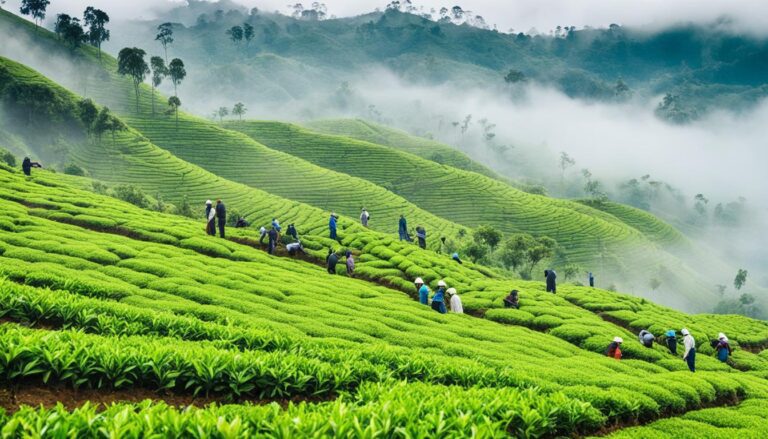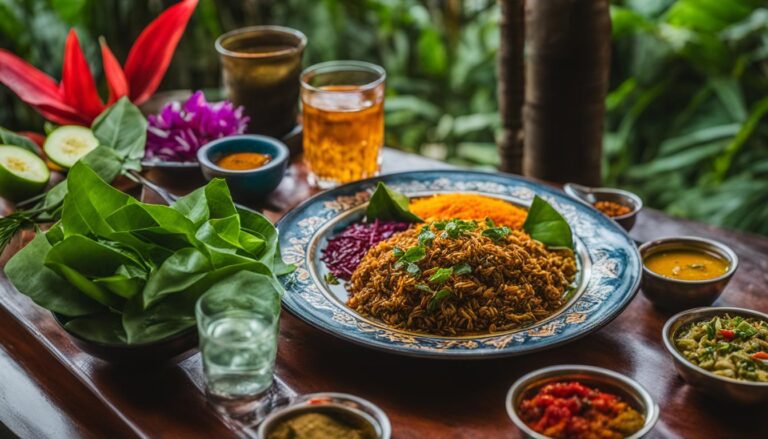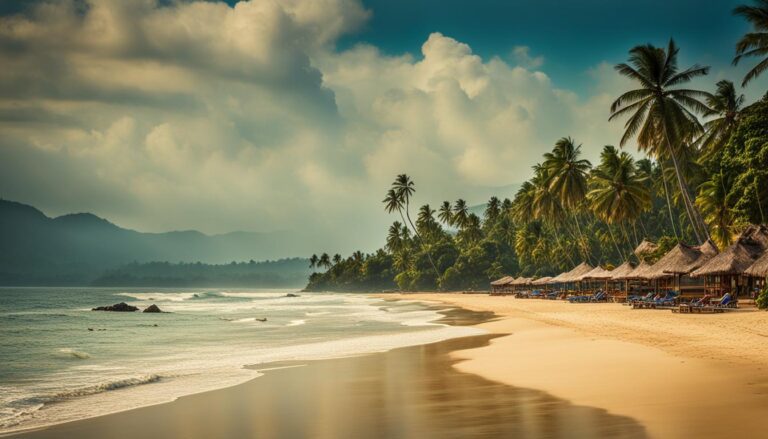10 must-know tips for safe travel on Sri Lanka
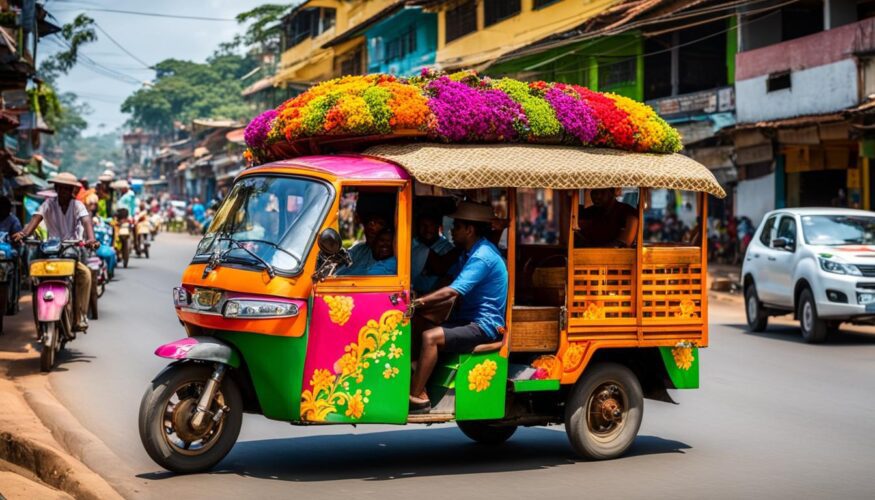
Welcome to Sri Lanka! If you’re planning to travel to this tourist destination, it’s good to have some basic information about this beautiful country. Sri Lanka is located in South Asia and offers an incredible combination of exotic beaches, culture, history and outdoor adventure.
Sri Lanka, also known as the Pearl of the Indian Ocean, is an island country rich in history and culture. Geographically, it is located in the southeast of India, and directly under the Indian Peninsula. This territory is rich in natural beauty such as tropical rainforests, waterfalls and mountain peaks that attract lovers of hiking and outdoor activities.
Sri Lanka’s history dates back to ancient times and the country is awash with amazing historical monuments. For example, the ancient city of Anuradhapura, which is the centre of the Buddhist religion, or the imposing rock fortress of Sigiriya, a UNESCO World Heritage Site.
Buddhism is the main religion in Sri Lanka and a major influence on the lives of the local people. You will have the opportunity to visit ornate Buddhist temples and take time out for a spiritual experience. The local culture is stunning with its traditional dances, colourful festivals and the hospitality of the local people.
The best time to visit Sri Lanka is between November and March when the weather is dry and temperatures are mild. During this period you can enjoy sunny days and ideal conditions for swimming and exploring the island. Also remember to prepare light clothing, sunscreen and insect repellent.
Sri Lanka is a popular destination among travelers because of its diversity and friendly atmosphere. There is something to appeal to everyone, whether it be beach holidays, sightseeing historical sites, trekking in the mountains or sampling the local cuisine. If you head to this exotic destination, be sure to familiarize yourself with local customs and observe etiquette to maintain respect for the local culture.
This is just an introduction to Sri Lanka as a travel destination. In the following sections of the article, we will take a deeper look at practical information such as documents and visa, travel insurance, safety, dining and other points of interest to help you plan and experience a memorable trip to Sri Lanka.
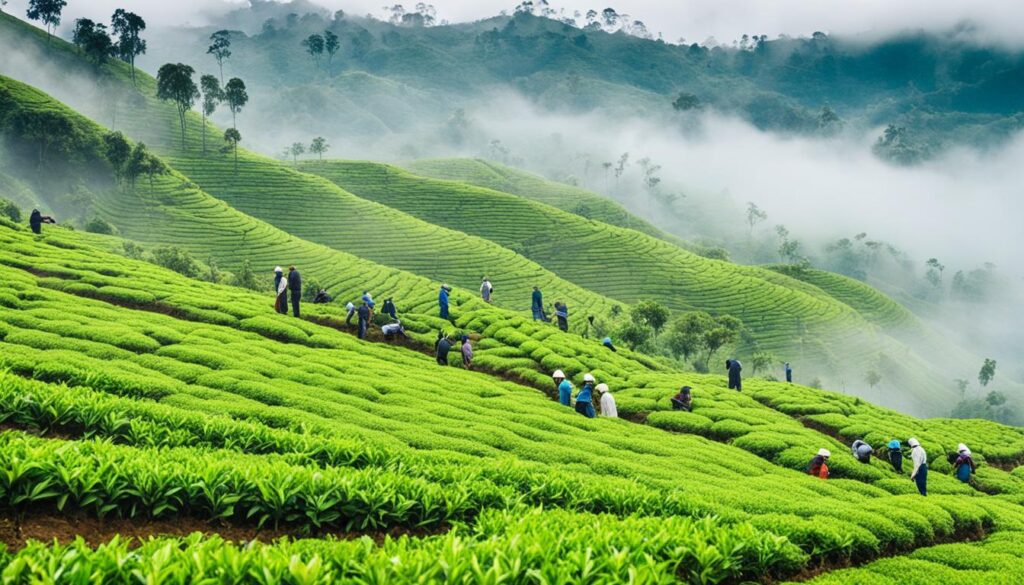
Passport and visa validity: a basic requirement for entry to Sri Lanka
If you are planning to travel to Sri Lanka, it is important to be aware of the necessary documents and visas.
What documents will you need to travel to Sri Lanka
To travel to Sri Lanka, you will need. Make sure your passport meets this requirement.
- Visa: If you are planning a tourist trip, you can obtain a tourist visa on arrival at Colombo airport. For longer stays or business trips, it is essential to obtain a visa in advance from the Sri Lankan Consulate or Embassy.
- Other identification documents: It is advisable to carry additional copies of important documents such as an ID card or international driving license. These documents can be useful in case your passport is lost or stolen.
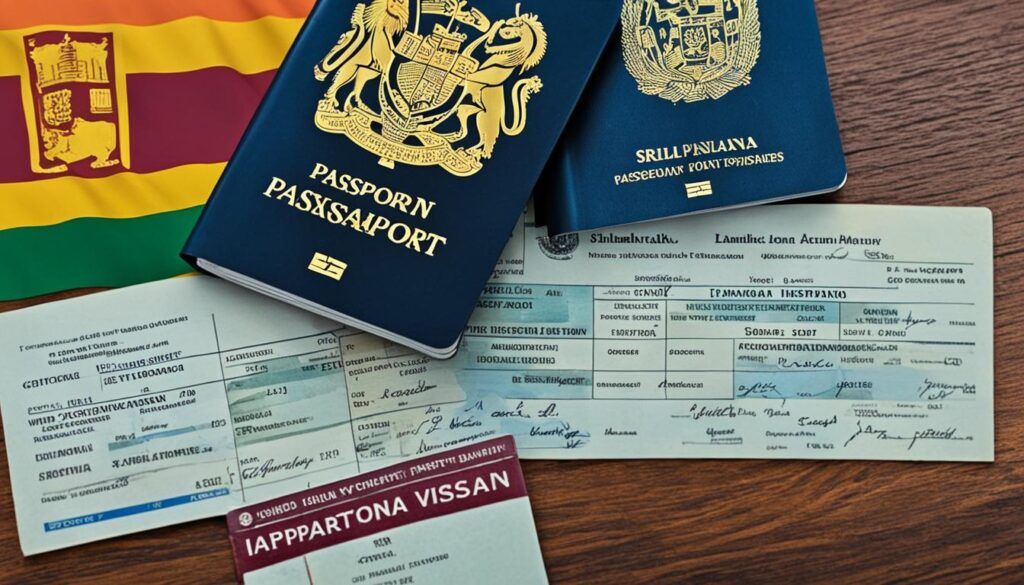
Travel Insurance: protection in case of unexpected events
Did you know that having travel insurance when traveling to Sri Lanka is important? Not only does it provide you with protection in case of health problems or unexpected unpleasant events, it also helps you protect your assets. No one wants to think about the possibility of an accident or loss of luggage while on vacation, but it’s important to be prepared for the unexpected.
When planning your trip to Sri Lanka, be sure to arrange travel insurance to provide coverage for medical care, medical expenses and compensation for lost luggage. With travel insurance, you will have greater peace of mind that you are well protected against any inconveniences.
Why is it important to have travel insurance when travelling in Sri Lanka
First of all, travel insurance provides you with financial protection in case of health problems or accidents during your trip. It will cover the cost of medical treatment, hospitalization and medicines you may need. It will also help you in case you need medical evacuation or transportation home due to a serious medical condition.
Travel insurance also provides compensation for lost or damaged luggage. This is an important factor because during travel, something can easily happen to your luggage. Having insurance will ensure financial compensation and help you replace lost or damaged items.
With the right travel insurance, you can ensure a peaceful and carefree holiday in Sri Lanka, knowing that you are well protected from any inconveniences. Take the time to choose the insurance company that suits you best and be sure to read the terms and conditions before you travel.
Safety in Sri Lanka: How to Avoid Problems
In this article, you will learn how to avoid problems and improve personal safety while travelling in Sri Lanka. I will provide general safety tips to help you minimize risks and ensure a safe stay. It is important to be cautious and know how to behave in unfamiliar environments, especially in foreign countries.
General safety tips for travelling to Sri Lanka
Here is a list of general safety tips to help increase your safety during your stay in Sri Lanka:
- Current safety information: Before travelling to Sri Lanka, check with government authorities and consulates for current safety information and advice. Follow travel warnings and advisories and stay informed of potential dangers.
- Storage of valuables. Take advantage of your hotel’s safe deposit boxes and leave unnecessary valuables at home.
- Safety at night: Move with discretion and avoid deserted and dark areas. If possible, travel in a group and use licensed taxis or recommended means of transport.
- Follow local laws. Take responsibility for your actions and be aware of cultural differences that might affect your behaviour.
- Trust your instincts: If you don’t feel safe, follow your instincts and seek a safe environment. Observe your surroundings and be alert to suspicious activities or situations.
Beach and water sports safety in Sri Lanka
Being on the beach and participating in water sports are some of the popular activities in Sri Lanka. However, it is important to remember a few safety precautions to minimize risks and enjoy your time at the beach:
- Respect signs and instructions issued by local rescue teams and lifeguards. Follow instructions on how to swim and stay safe at the beach.
- Be aware of your skills and experience when doing water sports such as surfing, diving or jet skiing. If you are inexperienced, don’t be afraid to use an instructor.
- Watch the weather and reports on tides, waves and other sea conditions. Avoid swimming in dangerous conditions.
- Keep your valuables in a safe place and well hidden. Do not leave your valuables unattended.

Women and men should respect local customs and culture
When travelling in Sri Lanka, it is important to understand and respect the local customs and culture. This exotic destination is rich in traditional values and rituals, which are an important part of the lives of the local people.
What are the local customs and culture in Sri Lanka?
Local customs in Sri Lanka are influenced by religion, especially Buddhism and Hinduism. Many Sri Lankans follow these religions and observe religious rituals. It is therefore important to show respect for these customs and adapt to local traditions.
Culture in Sri Lanka is rich and diverse. The locals are known for their hospitality and friendly attitude. It is customary to greet and show respect to elders and the community. In addition, it is important to maintain good manners and respect local traditions and customs.
Local culture in Sri Lanka is also reflected in food, dress and art. Sri Lanka is known for its rich cuisine, traditional dances and handicrafts. It is a great opportunity for travelers to discover and experience this unique culture.
When traveling in Sri Lanka, it is important to be respectful of local customs and adapt to the local culture. This way we can show respect for the local people and create a welcoming and friendly environment.
How to follow local etiquette and respect local customs
If you are visiting Sri Lanka, it is important to follow local etiquette and respect local customs. Below are some tips to help you be a considerate traveller:
- Dress: Respect local customs and dress politely and modestly. Especially when visiting religious places, it is advisable to keep shoulders and knees covered.
- Conduct in religious places. Be respectful of people praying and avoid invading their space.
- Giving and receiving: In Sri Lankan culture, it is considered a respectful gesture to use the right hand or both hands when giving and receiving things.
- Food: Traditionally, food is served on a plate or banana leaf and eaten with the fingers of the right hand. If you are unsure, you can ask a local for advice or choose cutlery.
- Photography: Always make sure you have permission before taking photos of people or holy places. Also, keep in mind that some people may not want to be photographed and respect that.
It is important to remember that you are a guest in a country with a rich culture and traditions, so it is your responsibility to respect those customs and be respectful of the locals.

Food and water: How to Avoid Health Problems
In this article you will learn how to avoid health problems related to food and drinking water in Sri Lanka. It is important to ensure food safety and to make sure you have an adequate supply of drinking water during your stay in this exotic destination.
What are the guidelines for eating out in Sri Lanka?
When eating in Sri Lanka, it is a good idea to follow a few basic guidelines to minimize the risk of foodborne illness:
- Select established and well-rated places to eat that adhere to strict hygiene standards.
- Try to eat fresh and well-cooked food.
- Limit eating raw fruits and vegetables unless properly washed.
- Wash your hands thoroughly before eating and use hand sanitizer if running water and soap are not available.
By following these dietary guidelines, you will minimize the risk of foodborne infections and protect your health while traveling in Sri Lanka.
How to provide drinking water while in Sri Lanka
Drinking water is essential to maintain health and fitness while traveling in Sri Lanka. Here are a few ways to ensure safe drinking water:
- Buy bottled water or water labeled “drinkable” from trusted sources.
- Disinfect your water by boiling or using water purifiers or disinfectant tablets.
- Prefer drinks without ice and avoid unverified water sources such as public fountains.
Ensuring you drink water during your stay in Sri Lanka is key to preventing stomach ailments and maintaining good health.
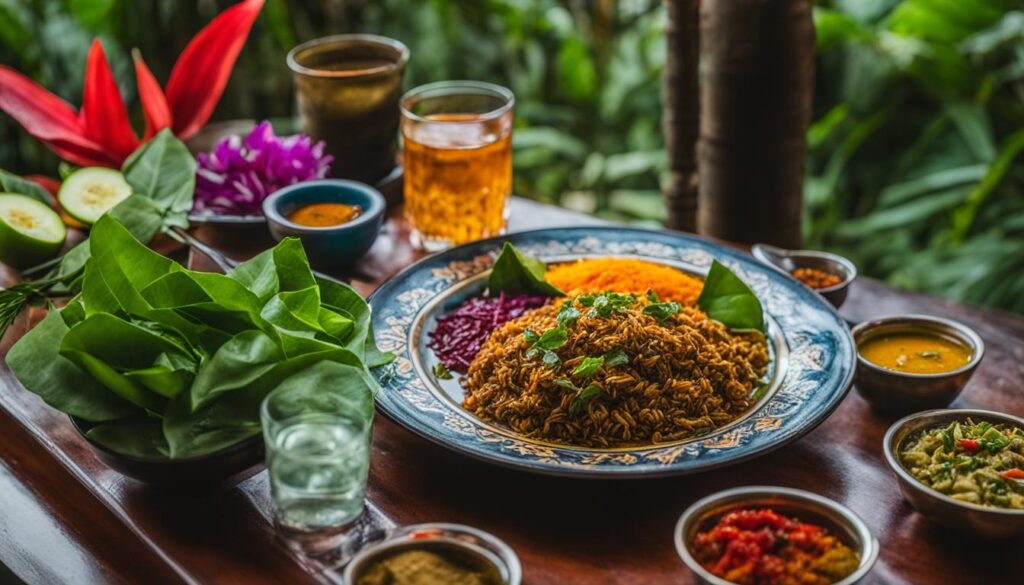
Accessories: essential equipment for every traveller
When travelling in Sri Lanka, it is important to carry the right equipment and accessories to make your trip comfortable and hassle-free. Regardless of the length of your trip, there are a few key items that you should not forget.
One of the most important items is a quality backpack. It is important to choose a backpack that is suitable for your type of travel. Consider the size, capacity and comfort of the backpack so that you can move easily and have all the essentials on hand.
Another important accessory is travel adapters. Sri Lanka uses a different type of sockets and voltage than many other countries, so it is advisable to ensure you have the correct adapters for your electronic devices beforehand.
You must not forget your travel documents. It is advisable to carry copies of your passport and other important documents with you so that if you are lost, you can easily prove your identity and get the help you need.
Also consider a small first aid kit with medicines for common ailments such as headaches, digestive problems or colds. It’s a good idea to keep medications you use regularly on hand so you can continue your treatment while traveling.

In preparation for travel to Sri Lanka, it is important to consider the local climate and culture. Consider what clothing and footwear would be appropriate for your activities and conditions in Sri Lanka. For example, lightweight and breathable clothing is ideal for hot and humid climates.
Also keep in mind the need for local currency. Find out what the best currency exchange options are and whether it is preferable to use cash or credit cards.
The list of accessories and equipment may vary depending on your individual needs and preferences. It’s important to review the list of recommended accessories before your trip and check that you have everything ready and packed in your backpack.
Activities: Be careful with beach activities
Your stay in Sri Lanka will not be complete without a visit to its beautiful beaches. These offer not only the opportunity to swim in the ocean, but also a wide range of water activities for fun and adrenaline rush. However, it is important to keep safety precautions in mind so that you can enjoy these activities to the fullest and without any risk.
What to do and how to behave during beach activities in Sri Lanka
It is important to follow the following tips while doing beach activities:
- Respect the guidelines and signs regarding beach safety and water sports.
- Don’t inflate inflatable attractions on the beach if nearby hazardous weather conditions dictate.
- Maintain excellent physical condition and match your activities to your ability.
- Avoid consuming alcohol during water activities.
- Safety is always the first priority, so don’t hesitate to seek advice from local experts or instructors.
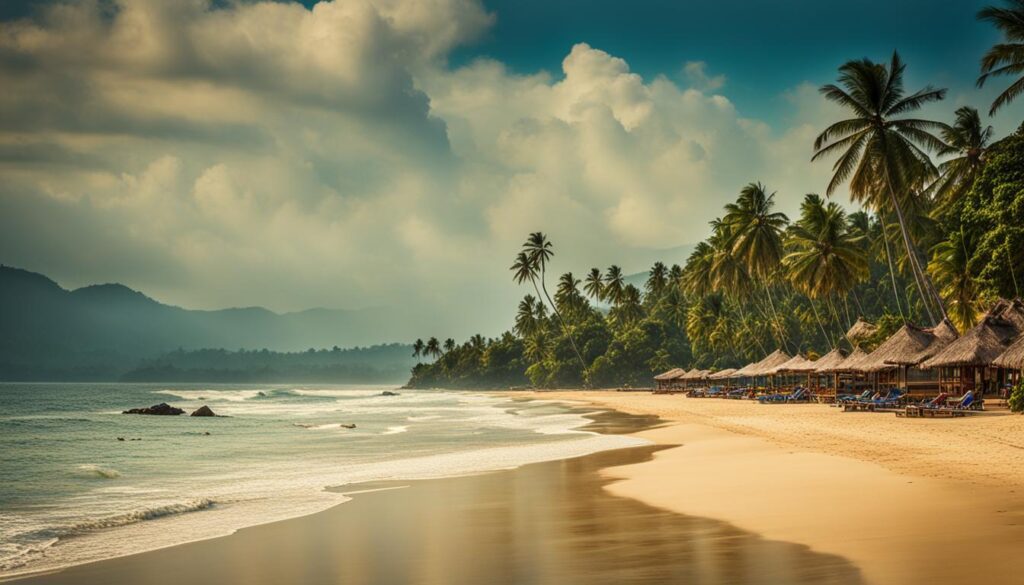
For added safety, we recommend that you look up information on water activities such as surfing, diving or sailing before you go. Local experienced instructors will help you with your first steps and give you the necessary instructions.
Proper behaviour and safety precautions are key to ensuring your beach activities in Sri Lanka run smoothly. Enjoy the sun, sand and waves, but always with your personal safety in mind.
Transportation: How to travel safely in Sri Lanka
In this section of the article, you will learn how to get around Sri Lanka safely. You will find out important information about public transport, including buses, trains and tuk tuks. I will also talk about the taxi and car rental situation in Sri Lanka. This section of the article provides useful information about transport to help you plan and execute your movements around Sri Lanka safely and efficiently.
How to get around Sri Lanka by public transport
Public transport in Sri Lanka provides various options for travelling around the country. Buses are the most widely used mode of transport and are affordable. There are various bus routes that can transport you between cities and to areas of tourist interest. Trains are also a popular option, especially among travelers who want to avoid road traffic. Tuk tuks are another option that you can hire for shorter moves in cities. When travelling on public transport, it is important to be cautious and watch your valuables as well as be mindful of your personal safety.
What is the situation with taxi and car rental services in Sri Lanka
Taxi services in Sri Lanka are widely available, especially in the larger cities and tourist areas. It is advisable to seek out licensed taxi companies and arrange a price in advance to avoid any inconvenience. Car rental companies are also available and if you decide to rent a car, make sure you have a valid driver’s license and know the local traffic laws.
Emergency Situations: How to behave in an emergency
In the event of an emergency in Sri Lanka, it is important to know how to behave and who to contact for help. The first step is to carry important emergency and ambulance contacts. In the event of a health or safety emergency, it is advisable to immediately call the emergency line at 112, which is available throughout the island.
If you experience an accident or illness, seek medical attention as soon as possible. Sri Lanka has hospitals and clinics that provide medical care. Pharmacies are also open where you can purchase necessary medicines.
In case of loss of valuables or theft, contact the nearest police station to report the incident. The Sri Lankan police are ready to assist and deal with security problems. Have important documents and information about the incident ready to assist the police in their investigation.
FAQ
What documents will you need to travel to Sri Lanka
You will need a valid passport with sufficient validity to travel to Sri Lanka. Your passport must be valid for at least six months from the date of entry into the country.
What are the visa requirements to enter Sri Lanka?
You will need a valid visa to enter Sri Lanka. Tourist visa can be obtained online in advance or at the airport upon arrival. For a work or study stay, you will need a special visa which must be arranged in advance. Make sure you meet all the requirements and have the necessary documents to obtain your visa.
Why is it important to have travel insurance when travelling in Sri Lanka?
Having travel insurance when travelling in Sri Lanka is important to protect your health and property. Travel insurance will provide you with financial cover in case of illness, injury or loss of luggage. It can also cover medical treatment, evacuation, or compensation for unforeseen events. It is important to choose insurance that covers all your needs during your stay in Sri Lanka.
What should be included in travel insurance for a trip to Sri Lanka?
Travel insurance for a trip to Sri Lanka should include medical treatment and cover for medical expenses. It should also include insurance for loss of luggage and compensation for loss of luggage. If you plan to engage in water sports, the insurance should be extended to cover the risks associated with these activities.
What are the local customs and culture in Sri Lanka?
There is a rich culture and religious customs in Sri Lanka. The main religion is Buddhism, but Hinduism, Christianity and Islam are also widespread. The local people are very friendly and respect their customs and traditions. If you visit a temple or holy place, remember to show respect and follow the appropriate rules of dress and behaviour.
How to follow local etiquette and respect local customs?
It is important to respect local etiquette and customs when travelling in Sri Lanka. Be considerate and show respect to the locals. For example, avoid public displays of affection, dress modestly when visiting temples and do not harass wild animals. Remember that expressing your respect and interest in local culture can bring you wonderful experiences and encounters with local people.
What are the food policies in Sri Lanka?
When eating out in Sri Lanka, it is important to pay attention to hygiene. Avoid unfamiliar street stalls and only consume well-cooked food. Beware of fruits and vegetables that you may not peel yourself. It is also advisable to drink bottled water and avoid drinking tap water. It is important to be cautious to minimize the risk of health problems associated with eating and drinking water.
How to ensure you have drinking water while in Sri Lanka
It is important to ensure you have drinking water during your stay in Sri Lanka. It is recommended to drink unopened bottled water to avoid the risk of contamination. If you buy bottled water, check that they are intact. If bottled water is not available, water from a clean source can be used and boiled.
What are the essentials for any traveller in Sri Lanka?
When traveling to Sri Lanka, it is advisable to have some accessories and equipment. These include a good quality and comfortable backpack that will provide enough space for your belongings. It is also important to give is attention to your travel documents such as passports and reservations etc. You should also have a small first aid kit with essential medicines and supplies. Don’t forget adapters for electronics, local currency and other necessities you will need during your trip.
What are the emergency contacts in Sri Lanka?
In an emergency, it is important to have important contacts for help. If it is a health or safety emergency, call the emergency 112 line immediately for help.
How to behave in a health or security emergency in Sri Lanka
In the event of a medical or security emergency in Sri Lanka, it is important to remain calm and act quickly. Call the emergency line and provide the necessary information about the situation. If it is a medical emergency, seek the nearest medical facility or ambulance. In case of loss of valuables or theft, contact the local police immediately and provide them with any relevant information. Keep a copy of your documents and insurance with you to facilitate the necessary formalities.
